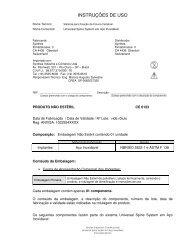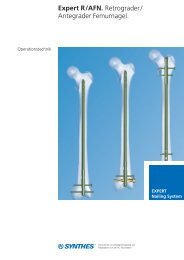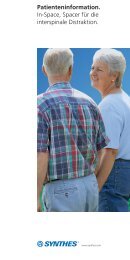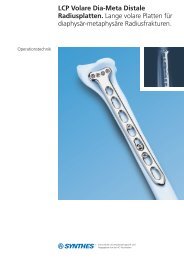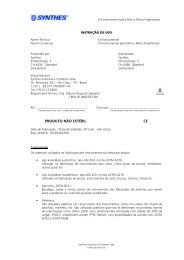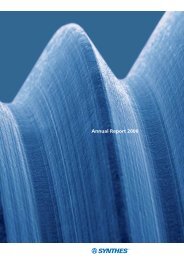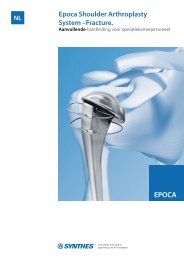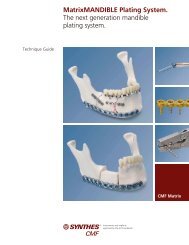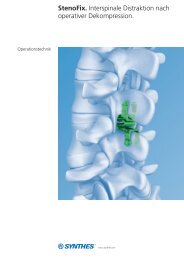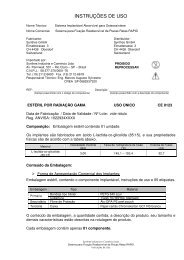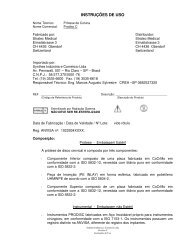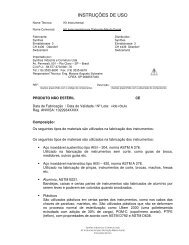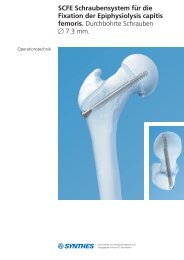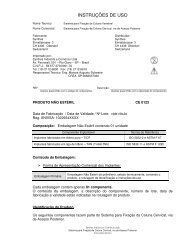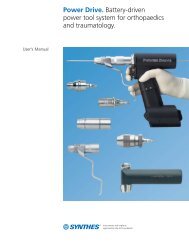Corporate Governance 2007 - Synthes
Corporate Governance 2007 - Synthes
Corporate Governance 2007 - Synthes
You also want an ePaper? Increase the reach of your titles
YUMPU automatically turns print PDFs into web optimized ePapers that Google loves.
<strong>Corporate</strong> <strong>Governance</strong><br />
42
<strong>Synthes</strong>. Annual Report <strong>2007</strong><br />
<strong>Corporate</strong> <strong>Governance</strong><br />
Group Structure and Shareholders 44<br />
Capital Structure 45<br />
Board of Directors 46<br />
Group Management Committee 52<br />
Compensation, Shareholdings and Loans 53<br />
Shareholders’ Participation 55<br />
Changes of Control and Defense Measures 57<br />
Auditors 58<br />
Information Policy 59<br />
43
<strong>Corporate</strong> <strong>Governance</strong><br />
1. Group Structure and Shareholders<br />
1.1 Group structure<br />
<strong>Synthes</strong>, Inc. and subsidiaries (the Group) is comprised of <strong>Synthes</strong>,<br />
Inc., a corporation registered in Delaware, USA (<strong>Synthes</strong>, Inc. or the<br />
Company) and the unlisted companies as shown on pages 37 and 38<br />
in the Financial Review. The Financial Review contains detailed segment<br />
reporting.<br />
The Group develops, manufactures, and distributes instruments, implants<br />
and biomaterials for the surgical fixation, correction and regeneration<br />
of the human skeleton and its soft tissues, including both<br />
metallic and osteobiological materials in different areas of the world.<br />
Additionally, the Group has a power tools business including development,<br />
manufacturing and distribution.<br />
<strong>Synthes</strong>, Inc. shares of Common Stock are listed on the SWX and included<br />
in the Swiss Market Index (SMI) and are traded on virt-x, the SWX’s<br />
blue chip trading platform in London. The Swiss securities number for<br />
<strong>Synthes</strong>, Inc. stock is number 1863105. The ISIN is US87162M4096. Market<br />
capitalization as of December 31, <strong>2007</strong> was CHF 16,689,190,896,<br />
corresponding to approximately US$14,708,183,936.<br />
1.2 Significant shareholders<br />
The following table sets forth the identities of the significant shareholders<br />
of <strong>Synthes</strong>, Inc. and their holdings of shares at year-end.<br />
Shareholder Shares %<br />
Dr. h.c. mult. Hansjörg Wyss, MD 47,479,770 40<br />
Wyss 1989 Distributive Trust 12,043,117 10<br />
AO Technology AG 3,704,488 3<br />
1.3 Cross-shareholdings<br />
None.<br />
44
<strong>Synthes</strong>. Annual Report <strong>2007</strong><br />
2. Capital Structure<br />
2.1 Capital on the disclosure deadline<br />
See Financial Review, Note C11, page 30.<br />
2.2 Authorized and conditional capital in particular<br />
– Conditional capital: None<br />
– Authorized capital: see Financial Review, Note C11, page 30.<br />
2.3 Changes in capital<br />
No changes in the Company’s capital structure were effected in the<br />
last three financial years with the exception of a transaction on March<br />
15, 2006 (see Note C21 in the Financial Review) in which it issued<br />
3,704,488 shares, issuance of 23,281 shares to members of the Board<br />
of Directors in 2005, 22,990 shares to members of the Board of<br />
Directors in 2006, and 25,500 shares to members of the Board of<br />
Directors in <strong>2007</strong>, and issuance of 7,500 shares in <strong>2007</strong> to an employee<br />
upon exercise of options.<br />
2.4 Shares and participation certificates<br />
See Financial Review, Note C11, page 30.<br />
Each registered share of Common Stock carries one vote at the Shareholders’<br />
Meeting of <strong>Synthes</strong>, Inc. and is entitled to dividends. Voting<br />
rights may be exercised only after a shareholder has been recorded in<br />
the Company’s share register as a shareholder with voting rights.<br />
Currently, there is no preferred stock issued.<br />
The by-laws do not provide for <strong>Synthes</strong>, Inc. issuing any participation<br />
certificates.<br />
recognize any transferee who is a U.S. Person as a shareholder of the<br />
Company for any purpose whatsoever and shall not record any transferee<br />
who is a U.S. Person as a shareholder of record. Excepted from<br />
these transfer restrictions are persons (i) who are Qualified Institutional<br />
Buyers as defined in Rule 144A of the Securities Act of 1933<br />
who purchased shares of the Company in its secondary offering, or<br />
(ii) transferees of such persons who comply with applicable resale restrictions.<br />
Any voting instruction received from a U.S. Person or bearing a U.S.<br />
postmark shall be presumed to evidence a prohibited transfer of the<br />
shares, or interests therein or rights thereof, as to which such voting<br />
instructions relate, and shall, accordingly, be disregarded by the Company<br />
and shall be deemed void and of no effect.<br />
No exceptions to the restrictions described above have been granted.<br />
Please see Section 6.1 below for requirements for changing or<br />
eliminating restrictions contained in the Certificate of Incorporation<br />
or the by-laws.<br />
<strong>Synthes</strong>, Inc. does not limit or restrict nominee registrations.<br />
2.7 Convertible bonds and warrants/options<br />
The features of the Equity Incentive Plan are detailed in the Financial<br />
Review, Note B14, page 14 and Note C11, page 30. There are no outstanding<br />
bonds or warrants.<br />
2.5 Profit Sharing Certificates<br />
<strong>Synthes</strong>, Inc. has not issued any profit sharing certificates.<br />
2.6 Limitations on transferability and nominee registrations<br />
The by-laws provide that <strong>Synthes</strong>, Inc. shall abide by the procedural<br />
rules established from time to time by the securities clearing institutions<br />
through which the shares of the Company are traded and settled.<br />
This does not, however, limit the transferability of the shares.<br />
Moreover, the by-laws provide that so long as the shares of stock of<br />
the Company are not registered with the United States Securities and<br />
Exchange Commission, (i) any transfer or attempted or purported<br />
transfer of any shares of stock of the Company or any interest therein<br />
or right thereof to any person who is considered a United States<br />
person under the Securities Act of 1933 or Securities Exchange Act<br />
of 1934 (a "U.S. Person") shall be prohibited and shall be void and<br />
ineffective as against the Company, and (ii) the Company shall not<br />
45
<strong>Corporate</strong> <strong>Governance</strong><br />
3. Board of Directors<br />
3.1 Members of the Board of Directors<br />
Membership and qualification<br />
<strong>Synthes</strong> is led by a strong and experienced Board. The Board includes<br />
representatives drawn from broad international business and scientific<br />
backgrounds. Its members bring diversity in expertise and perspective<br />
to the leadership of a complex, highly regulated, global business.<br />
The Board of Directors of <strong>Synthes</strong>, Inc. consists of between seven and<br />
twelve members, the exact number to be set by the Board of Directors.<br />
Currently, the Board of Directors of <strong>Synthes</strong>, Inc. consists of ten<br />
members. A prior year amendment of the Company’s Certificate of<br />
Incorporation increased the maximum authorized number of Directors<br />
to twelve.<br />
Only Messrs. Wyss, Hedgepeth and Brönnimann have previously served<br />
as members of <strong>Synthes</strong>, Inc. senior management.<br />
Dr. h.c. mult. Hansjörg Wyss (MD), Swiss citizen, is Chairman of<br />
<strong>Synthes</strong>, Inc. and has held this position since its founding in 1999.<br />
Mr. Wyss has led the Group and its predecessor organization since<br />
1977. Until April 26, <strong>2007</strong>, Mr. Wyss also held the position of Chief<br />
Executive Officer of <strong>Synthes</strong>, Inc. Prior to his involvement with the<br />
Group, Mr. Wyss served in management roles at several European<br />
corporations including as a Director of Monsanto Europe SA; President-Managing<br />
Director of Schappe-Burlington AG as well as Assistant<br />
to the President of Burlington International. Education: MBA with<br />
distinction, Harvard Business School; Master of Science degree in Civil<br />
and Structural Engineering, Swiss Federal Institute of Technology;<br />
Honorary Doctorates of Medicine, University of Basel and University<br />
of Salzburg.<br />
Mr. Charles Hedgepeth, U.S. citizen, has held the title Vice Chairman<br />
of the Board of Directors of <strong>Synthes</strong>, Inc., since February 2002. Prior<br />
to this, Mr. Hedgepeth held the title of Board Member and member<br />
of the Office of the Chairman. Preceding his retirement in January<br />
2002, Mr. Hedgepeth served the Company in a number of different<br />
roles. He was President & COO from 1995 until 1999. Mr. Hedgepeth<br />
continued as President until January 2001. Mr. Hedgepeth has been<br />
with <strong>Synthes</strong> (U.S.A.) since 1989 when he was retained as the Vice<br />
President of Manufacturing. Prior to his involvement with the Group,<br />
Mr. Hedgepeth served in management roles overseeing operations<br />
and manufacturing at several United States corporations. Education:<br />
B.Sc. in Industrial Management, Johns Hopkins University; Stanford<br />
University Executive Program; Certified Manufacturing Engineer.<br />
Mr. Robert Bland, U.S. citizen, is currently President of Dunster Associates,<br />
a consulting firm. Prior to this, he was Founder and President<br />
of Quality Health and also was President of NEMC Real Estate between<br />
1990 and 1996. Earlier, he was President of Amoskeag Development<br />
Corporation, a Boston real estate development firm. Between 1970<br />
and 1986 he was founder, Executive Vice President, and Chief Financial<br />
Officer of Health Systems, Inc., a healthcare and management consulting<br />
firm. He is currently Vice Chairman of the Roxbury Preparatory<br />
Charter School. Education: B.A., Harvard University.<br />
Dr. Roland Brönnimann, Swiss citizen, was Managing Director of the<br />
former <strong>Synthes</strong> Europe and Latin American regions of <strong>Synthes</strong>, Inc.<br />
Preceding this position, he was a member of the executive committee<br />
of F. Hoffmann-La Roche Ltd. and was the head of the Vitamins<br />
and Fine Chemicals Division. Prior to this, he was a manager of<br />
production. Before he arrived at Hoffmann-La Roche Ltd. in, he<br />
worked for twenty years at Lonza Ltd. where he held various positions<br />
in research, development and manufacturing. Education: Masters<br />
Degree in Chemistry, Swiss Federal Technology Institute; Ph.D.<br />
in Chemistry, Swiss Federal Technology Institute. In addition to<br />
serving as a member of the Board of Directors of <strong>Synthes</strong>, Inc.,<br />
Dr. Brönnimann provides services to one of the Company's Swiss<br />
subsidiaries. This primarily involves special projects on behalf of the<br />
Chairman in exploring additional business opportunities in Europe.<br />
Dr. David L. Helfet, MD, U.S. citizen, is an Attending Orthopedic Surgeon<br />
at the Hospital for Special Surgery as well as the New York Presbyterian<br />
Hospital in New York, where he also is the Director of the<br />
Combined Orthopedic Trauma Service at both institutions. He is a Professor<br />
of Orthopedic Surgery at Weill Medical College of Cornell University<br />
in New York. Dr. Helfet serves as a member of the Hospital for<br />
Special Surgery Board of Trustees, and as a trustee of the AO Foundation<br />
and AO North America. In addition, Dr. Helfet is the Chairman<br />
of the AO Foundation Documentation and Publishing Board. Over the<br />
years, Dr. Helfet held several hospital appointments including at the<br />
Johns Hopkins Hospital, Union Memorial Hospital and The Good<br />
Samaritan Hospital, all in Baltimore, Maryland and at Tampa General<br />
Hospital in Tampa, Florida. Dr. Helfet is Board Certified (American<br />
Board of Orthopedic Surgery), a Fellow of the American Academy of<br />
Orthopedic Surgeons, the American Orthopedic Association and former<br />
President of the Orthopedic Trauma Association. Education: B.Sc.<br />
in Biochemistry (with honors), University of Cape Town; M.B.CH.B,<br />
University of Cape Town Medical School; Orthopedic Residency, Johns<br />
Hopkins Hospital.<br />
46
<strong>Synthes</strong>. Annual Report <strong>2007</strong><br />
Mr. Amin Khoury, U.S. citizen, is Founder, Chairman of the Board and<br />
CEO of B/E Aerospace, Inc., the world’s leading manufacturer of cabin<br />
interior products for both commercial airliners and business jets.<br />
Education: B.Sc. in Chemistry, Villanova University; M.Sc. in Chemistry,<br />
Villanova University; MBA with distinction, Northeastern University.<br />
Dr. Allen Misher, U.S. citizen, is President Emeritus of the Philadelphia<br />
College of Pharmacy and Science. His business experience encompasses<br />
18 years with SmithKline and French Laboratories in the<br />
fields of pharmacology, research & development, manufacturing, as<br />
well as various senior management positions including President of<br />
the Medical Diagnostic Group. He has served on various corporate<br />
boards of publicly traded companies, and as the Chairman of US Bioscience,<br />
Inc. Education: B.Sc., Philadelphia College of Pharmacy and<br />
Science; Ph. D., Physiology, University of Pennsylvania; D.Sc, University<br />
of the Sciences of Philadelphia (Honorary).<br />
Mr. André Mueller, Swiss citizen, held a number of managerial positions<br />
in the strategic planning and finance divisions of Sandoz both<br />
at headquarters and in the United States. In 1981, he became Vice<br />
President of Finance and Administration, and subsequently, was<br />
named the first Chief Financial Officer of Biogen. In this capacity, Mr.<br />
Mueller was responsible for several financing rounds including the<br />
company’s IPO. In 1985, he became a Founding Partner and was subsequently<br />
named Director of Investments of Genevest, the first Swiss<br />
venture capital organization, a situation he left in 1993 to head the<br />
Management Consulting practice of Deloitte & Touche in Geneva.<br />
Over the last two decades, Mr. Mueller was involved in the financing<br />
and the management of a substantial number of start-up companies<br />
including Actelion and FotoWire Development SA. From 1998 to<br />
2003, he had been Actelion’s CFO and Head of Strategic Development.<br />
He is currently Vice-Chairman of the Board of Actelion and also<br />
on the Board of a number of privately held Biotech companies in<br />
Switzerland. Education: Chartered Chemical Engineer, Superior Technical<br />
College, Geneva; Licenciate, Business Economics, University of<br />
Geneva; MBA, INSEAD Fontainbleau.<br />
and trading company. Currently, Mr. Pardo is a Director of Newalta<br />
Corporation and Western Prospector Group LTD. He has also served<br />
on the Boards of the Exchange National Bank in Chicago, Invatec, ISG<br />
Technologies, Panaco and several other companies. As part of his previous<br />
Board responsibilities, Mr. Pardo had been Chairman of <strong>Corporate</strong><br />
<strong>Governance</strong>, Environmental, Health and Safety and Compensation<br />
committees. He has also served on the Audit Committee of<br />
various companies. Education: BA in Economics, Brown University;<br />
MBA in Finance, Wharton (University of Pennsylvania); Massachusetts<br />
Institute of Technology Program for Senior Executives.<br />
Mr. Jobst Wagner, Swiss citizen, is the President of the Supervisory<br />
Board of the REHAU Group in Muri, Berne/Switzerland. Before assuming<br />
this position, he has held various functions within the REHAU<br />
organization, especially in purchasing and logistics. REHAU is a leading<br />
polymer manufacturer and systems supplier in the construction,<br />
automotive and industry sectors with over 160 locations in 51 countries.<br />
Mr. Wagner is a member of the board of the Swiss private bank<br />
Von Graffenried AG. Education: Graduated in law (lic.iur.), University<br />
of Berne.<br />
Mr. Felix Pardo, U.S. citizen, was Chairman and CEO of Dyckerhoff,<br />
Inc. and Chairman of its subsidiaries, Lone Star Industries and Glens<br />
Falls Cement, until his retirement in 2002. From April to November<br />
of 1998, he was President and CEO of Philip Services Inc. He also<br />
served on the Philip Services Board of Directors from 1994 through<br />
2003. From 1992 to 1998, Mr. Pardo was President and CEO of Ruhr<br />
American Coal Corporation, a United States coal production, sales<br />
47
<strong>Corporate</strong> <strong>Governance</strong><br />
The following table sets forth the name, birth year, principal position,<br />
time of first election and the remaining term of office of each member<br />
of the Board of Directors:<br />
Name Birth year Position First election Remaining term<br />
Dr. h.c. mult. Hansjörg Wyss (MD) 1935 Chairman – Executive 1999 2009<br />
Charles Hedgepeth 1937 Vice Chairman – Non-Executive 2002 2010<br />
Robert Bland 1940 Non-Executive 1999 2008<br />
Dr. Roland Brönnimann 1937 Non-Executive 2003 2008<br />
Dr. David Helfet 1947 Non-Executive 2001 2009<br />
Amin Khoury 1939 Non-Executive 1999 2010<br />
Dr. Allen Misher 1933 Non-Executive 1999 2008<br />
André Mueller 1944 Non-Executive 1999 2009<br />
Felix Pardo 1937 Non-Executive 2005 2009<br />
Jobst Wagner 1959 Non-Executive 2005 2010<br />
3.2 Other activities and vested interests<br />
The respective information can be found for each member of the<br />
Board of Directors in section 3.1. The activities performed by the nonexecutive<br />
Directors, apart from their duties as members of the Board,<br />
are not directly related to the Company. Furthermore, the Group has<br />
no significant business connection with any company or organization<br />
represented by a member of the Board of Directors, except as disclosed<br />
in the Financial Review, Note C17, page 35.<br />
3.3 Cross-involvement (Repealed)<br />
3.4 Elections and terms of office<br />
The Board of Directors of <strong>Synthes</strong>, Inc. is elected at the annual Shareholders’<br />
Meeting. The Certificate of Incorporation provides that the<br />
Board of Directors must consist of between seven and twelve members<br />
at any time. Each member of the Board of Directors is normally<br />
elected for a term of three years and may be re-elected to successive<br />
terms. The Board of Directors is divided into three classes, with the<br />
term of office of one class expiring each year (staggered). At each annual<br />
meeting of shareholders the successors to the class of directors<br />
whose term shall then expire shall be elected to hold office for a term<br />
expiring at the third succeeding annual meeting following their election<br />
or such shorter term as proposed by the Board of Directors to<br />
ensure annual re-election of approximately one third of the Directors.<br />
There is no age restriction as to the election or retention of a Director;<br />
however, a Director may be removed by the shareholders with or<br />
without cause at any time. The Directors standing for election are<br />
elected by global vote.<br />
3.5 Internal organizational structure<br />
The Board of Directors is ultimately responsible for the general policies<br />
and management of <strong>Synthes</strong>, Inc. The Board of Directors establishes<br />
the strategic, organizational, accounting and financing policies<br />
to be followed by <strong>Synthes</strong>, Inc. and the other Group companies. The<br />
Board of Directors has delegated the conduct of the day-to-day business<br />
operations to the Group Management Committee, which is<br />
headed by the Chairman of the Board of Directors. The Chairman,<br />
Hansjörg Wyss, the sole executive member of the Board of Directors,<br />
is responsible for the overall management of the Group companies.<br />
The Board of Directors met five times in <strong>2007</strong>. Each meeting was approximately<br />
two days in length.<br />
48
<strong>Synthes</strong>. Annual Report <strong>2007</strong><br />
Allocation of tasks within the Board of Directors<br />
and members list<br />
Name Chairman/Vice-Chairman Audit Committee Compensation Committee<br />
Dr. h.c. mult. Hansjörg Wyss (MD) (Chair)<br />
Charles Hedgepeth<br />
Dr. Roland Brönnimann<br />
Amin Khoury<br />
(Chair)<br />
Robert Bland<br />
Dr. Allen Misher<br />
(Chair)<br />
André Mueller<br />
Dr. David Helfet<br />
Jobst Wagner<br />
Felix Pardo<br />
Tasks and area of responsibility for each committee<br />
The Board of Directors has established an Audit Committee and a<br />
Compensation Committee from its members. A person elected by the<br />
Board of Directors chairs each committee. The committees meet regularly<br />
and make full reports and recommendations to the Board of<br />
Directors at its regular meetings. Committee chairpersons set the<br />
agenda for committee meetings. The members of the board committees<br />
receive, in advance of committee meetings, documents allowing<br />
them to prepare for the items on the agenda.<br />
Succession planning and nomination for top positions within the<br />
Group are performed by the full Board of Directors, who take an active<br />
role in selecting and nominating the top positions within the<br />
Group. Given this involvement of the full Board, a nomination committee<br />
is not required.<br />
Audit Committee<br />
The Audit Committee acts in an advisory capacity to the Board of Directors<br />
and consists of four persons. Allen Misher is the Chairman<br />
and the other members are Robert Bland, André Mueller and Felix<br />
Pardo. The present members of the Audit Committee are non-executive<br />
members of the Board of Directors and are experienced in financial<br />
and accounting matters. The Chief Financial Officer and the<br />
Chief Compliance Officer attend meetings of the Audit Committee.<br />
The Audit Committee met four times in <strong>2007</strong>. Each meeting was approximately<br />
one-half day in length.<br />
The principal responsibilities of the Audit Committee are:<br />
– to discuss the auditor’s yearly reports with particular emphasis on<br />
the annual financial statements (both statutory and consolidated)<br />
and to present conclusions to the Board<br />
– to review and assess the auditing concept, examination process, examination<br />
instruments, Internal Audit Plan and examination programs<br />
– to discuss <strong>Synthes</strong>’ internal accounting procedures<br />
– to support the Board of Directors in its supervision of financial control<br />
through a direct link to Ernst & Young LLP (external auditors)<br />
and the Internal Audit Group<br />
– to keep itself regularly informed on important findings of the audits<br />
and of their progress<br />
– to support the Board of Directors in its oversight of the global compliance<br />
program through a direct link with the Chief Compliance<br />
Officer<br />
The Board of Directors has established an Internal Audit Group that<br />
reports directly to the Audit Committee. The Audit Committee periodically<br />
reviews and assesses the adequacy of the internal audit organizational<br />
structure, the internal audit scope, the audit plan and<br />
relevant processes, and whether recommended improvements have<br />
been implemented by the management in charge.<br />
The annual internal audit plan will also analyze risks associated with<br />
the following:<br />
– achievement of business goals and objectives<br />
– business process optimization<br />
49
<strong>Corporate</strong> <strong>Governance</strong><br />
– effectiveness of risk management, control and governance processes<br />
– safeguarding of assets<br />
– compliance with legal and regulatory requirements<br />
– data systems control and process<br />
– accounting system controls and processes<br />
– authorization of transactions<br />
– significant or unusual transactions<br />
– other areas of significance as determined by the audit committee<br />
Compensation Committee<br />
The Compensation Committee consists of three persons. Amin<br />
Khoury is Chairman; David Helfet and Jobst Wagner are the other<br />
members of the Compensation Committee. The Compensation Committee<br />
assists the Board of Directors in discharging its responsibilities<br />
relating to all compensation, including equity compensation of Company<br />
executives. The Committee has overall responsibility for evaluating<br />
and making recommendations to the Board regarding employee<br />
compensation, compensation under the Company’s Equity Incentive<br />
Plans and other Company compensation policies and programs. The<br />
Committee determines the compensation policies of the members of<br />
the Group Management Committee. All decisions of the Compensation<br />
Committee are subject to approval of the Board of Directors. The<br />
Compensation Committee has retained an outside consultant to review<br />
the Group’s executive compensation. During <strong>2007</strong> the Compensation<br />
Committee met three times, and in each case provided the<br />
Board of Directors a report on its findings and recommendations. Each<br />
meeting was a few hours in length. Members of management attend<br />
meetings of the Compensation Committee at the discretion of the<br />
Compensation Committee.<br />
Committee members and days attended <strong>2007</strong><br />
Full Board Audit Committee Compensation Committee<br />
Number of meeting days in <strong>2007</strong> 9 4 3<br />
Dr. h.c. mult. Hansjörg Wyss (MD) 9 – –<br />
Charles Hedgepeth 9 – –<br />
Robert Bland 9 4 1<br />
Dr. Roland Brönnimann 9 – –<br />
Dr. David Helfet 9 – 3<br />
Amin Khoury 9 – 3<br />
Dr. Allen Misher 9 4 –<br />
André Mueller 9 4 –<br />
Felix Pardo 9 4 –<br />
Jobst Wagner 9 – 2<br />
50
<strong>Synthes</strong>. Annual Report <strong>2007</strong><br />
Work methods of the Board of Directors and its Committees<br />
The Board meets as often as necessary, at least quarterly, and on notice<br />
by the Chairman or by a person designated by him. In addition,<br />
the Board must be convened as soon as a Board member requests<br />
the Chairman for a meeting. The average attendance at the <strong>2007</strong><br />
Board meetings was 100%. Each committee reports to the Board of<br />
Directors following each committee meeting.<br />
3.6 Definition of areas of responsibility<br />
The primary duties of the Board of Directors are as follows:<br />
– issuance of guidelines for business policy<br />
– establishment of policies and procedures concerning accounting<br />
and financial control as well as financial planning<br />
– approval, dismissal and supervision of members of senior management<br />
– supervision of preparation of the annual report of the Corporation<br />
– approval of any bankruptcy filing or compromise or arrangement<br />
with creditors in the case of insolvency<br />
– approval of the strategic direction of the Companies – approval of<br />
changes of business activities<br />
– approval of the establishment of new businesses and closing of<br />
businesses<br />
– approval of the purchase or sale of assets in excess of US$ 8 million<br />
– determination of the general framework, amount and time frame<br />
of bond issues<br />
– approval of new long-term and short-term bank debt in excess of<br />
US$ 10 million<br />
– approval of the yearly operational and consolidated investment<br />
budget<br />
3.7 Information and control instruments vis-à-vis the Group<br />
Management Committee<br />
The Board of Directors uses several tools to be kept informed about<br />
Group operations and exercise control over senior management:<br />
– The Board of Directors receives a monthly financial report generated<br />
by the <strong>Synthes</strong> management information system. The report is<br />
comprised of consolidated financial information and includes: a) an<br />
Income Statement, Balance Sheet, and Cash Flow Statement, including<br />
a comparison of each to budgeted and prior year figures;<br />
b) management performance comments; and c) communication of<br />
key issues.<br />
– Members of the Group Management Committee generally attend<br />
quarterly meetings of the Board of Directors, and the Chief Financial<br />
Officer and the Chief Compliance Officer attend meetings of<br />
the Audit Committee.<br />
– The internal audit function reports directly to the Chairman of the<br />
Audit Committee and is comprised of auditors who travel worldwide,<br />
completing audit assignments developed and assigned by the<br />
Audit Committee.<br />
– <strong>Synthes</strong> has a risk management process whereby key risks are identified<br />
and communicated to senior management.<br />
The Group Management Committee is responsible for the operational<br />
management of the Group, subject to the foregoing responsibilities<br />
reserved to the Board of Directors.<br />
The Chairman sets the agenda for board meetings. Any member of<br />
the Board of Directors may request that an item be included on the<br />
agenda. The members of the Board receive documents in advance of<br />
the board meeting which allow the members of the Board to prepare<br />
for the items on the agenda. Members of the Group Management<br />
Committee generally attend the quarterly meetings of the Board of<br />
Directors, and the Chief Financial Officer and the Chief Compliance<br />
Officer attend meetings of the Audit Committee.<br />
The Board of Directors hold discussions with officers of <strong>Synthes</strong>, Inc.<br />
and visit at least once per year one or more offices and plants.<br />
51
<strong>Corporate</strong> <strong>Governance</strong><br />
4. Group Management Committee<br />
4.1 Members of the Group Management Committee<br />
The following table sets forth the name, birth year and principal positions<br />
of those individuals who were members of the Group Management<br />
Committee as of December 31, <strong>2007</strong>:<br />
Name Birth year Position<br />
Dr. h.c. mult. Hansjörg Wyss (MD) 1935 Chairman<br />
Michel Orsinger 1957 President and Chief Executive Officer<br />
Robert Donohue 1947 Chief Financial Officer<br />
Ciro Römer 1962 President Europe, Middle East and Africa<br />
Dr. h.c. mult. Hansjörg Wyss (MD) is Chairman of <strong>Synthes</strong>, Inc. and<br />
has held this position since its founding in 1999 (see page 46).<br />
Mr. Michel Orsinger, Swiss citizen, is the President and, since April<br />
26, <strong>2007</strong>, Chief Executive Officer of <strong>Synthes</strong>, Inc. Prior to joining<br />
<strong>Synthes</strong> in 2004, Mr. Orsinger spent 10 years with Novartis in various<br />
executive management positions, most recently as the CEO and President<br />
of OTC Worldwide. Mr. Orsinger served as a member of the Nobel<br />
Biocare Board of Directors. Education: Business Administration<br />
Degree, Handelshochschule St. Gallen, Switzerland; Advanced Management<br />
Program, Harvard Business School, USA; Advanced Management<br />
Program, INSEAD Fontainebleau, France.<br />
4.2 Other activities and vested interests<br />
The respective information can be found for each member of the<br />
Group Management Committee in Section 4.1 above.<br />
4.3 Management contracts<br />
<strong>Synthes</strong>, Inc. and its subsidiaries have not entered into any management<br />
contracts with third parties.<br />
Mr. Robert Donohue, U.S. citizen, Chief Financial Officer of <strong>Synthes</strong>,<br />
Inc. is responsible for <strong>Synthes</strong>, Inc.’s financial reporting, internal controls<br />
and related issues. Additionally, Mr. Donohue holds the position<br />
of President, <strong>Synthes</strong> Canada, Ltd. (since 1998). Prior to this, Mr.<br />
Donohue held the position of Vice President of Finance for <strong>Synthes</strong><br />
(U.S.A). Mr. Donohue has been with <strong>Synthes</strong> since 1990 when he was<br />
retained as the <strong>Corporate</strong> Controller. Prior to joining the Group, Mr.<br />
Donohue served in several financial positions including corporate controller,<br />
plant controller, and other corporate positions within several<br />
major United States corporations. Education: B.Sc. in Economics,<br />
West Chester University; MBA, Widener University; Certified Public<br />
Accountant.<br />
Mr. Ciro Römer, Dutch citizen, has been the President of Europe, Middle<br />
East and Africa since 2003. Prior to this, Mr. Römer held the positions<br />
of Vice President Europe as well as General Manager for the<br />
Netherlands and Spain. Between 1983 and 1998 Mr. Römer held various<br />
positions at the OLVG clinic and Howmedica and has over 15<br />
years experience in the orthopedic industry. Education: Radulphus<br />
College; Advanced Management Program,Harvard Business School.<br />
52
<strong>Synthes</strong>. Annual Report <strong>2007</strong><br />
5. Compensation, Shareholdings and Loans<br />
5.1 Content and method of determining the compensation<br />
and the share-ownership programs<br />
Board of Directors<br />
The compensation of members of the Board of Directors is determined<br />
from time to time by the Board of Directors upon recommendation<br />
of the Compensation Committee.<br />
Members of the Board of Directors receive cash meeting fees of CHF<br />
2,000 per meeting day according to their individual attendance at<br />
Board and committee meetings. In addition, members of the Board of<br />
Directors may receive shares under the <strong>Synthes</strong>, Inc. Equity Incentive<br />
Plan. The cash remuneration paid, and the number of shares distributed<br />
under the Plan to each member of the Board of Directors during<br />
<strong>2007</strong> can be found in the Financial Review, Note C23, page 41.<br />
The Group also reimburses reasonable expenses incurred by members<br />
of the Board of Directors in attending meetings.<br />
Group Management Committee<br />
The Compensation Committee reviews the compensation of the<br />
members of the Group Management Committee at least annually.<br />
The Board of Directors determines the compensation of the Chief Executive<br />
Officer and reviews and approves the Chief Executive Officer’s<br />
recommendations for the compensation of the members of the<br />
Group Management Committee. The Compensation Committee has<br />
engaged an independent consulting firm to assist them in overseeing<br />
the executive compensation program. Survey data provides a reference<br />
for decisions about the appropriate level of incentives to be<br />
provided to senior management. The survey data is drawn from companies<br />
that were selected from an international peer group of comparable<br />
companies. In setting the pay level of the members of the<br />
Group Management Committee, survey data is reviewed along with<br />
a variety of other factors, including individual performance, competencies,<br />
skills, future potential, prior experience, scope of responsibility<br />
and accountability within the organization.<br />
The objectives of the compensation program are:<br />
3. Provide a total compensation package that is competitive with the<br />
market for executive talent, thereby enabling the Company to attract,<br />
retain and motivate executives.<br />
The major elements of the Company’s compensation program are<br />
base salary and an executive bonus plan:<br />
1. Base Salary: The Company provides senior management with a<br />
competitive fixed annual cash base salary. The base salaries are reviewed<br />
annually by the Compensation Committee; taking into account<br />
the results achieved by the executive, the executive’s future<br />
potential, scope of responsibilities, experience and competitive<br />
salary practices.<br />
2. Executive Bonus Plan: The Company has a Global Executive Bonus<br />
Plan which provides annual cash incentives based on both company<br />
performance and individual performance goals. Thirty percent<br />
of the compensation earned under the bonus plan is deferred (unless<br />
the participant elects to defer a larger portion) and paid upon<br />
retirement or upon a separation from service. The remainder is paid<br />
in cash. The value of units which are automatically deferred (30%)<br />
vests ratably over three years. Under this plan executives are assigned<br />
a number of units in the plan. The unit values are calculated<br />
by reference to the Company's Consolidated Earnings Before<br />
Income Taxes. The unit values can fluctuate both upwards and<br />
downwards based on company performance.<br />
In 2000, the Board of Directors and shareholders approved an Equity<br />
Incentive Plan for directors and employees, which authorized the<br />
issuance of up to 1,500,000 shares of Common Stock. The purpose<br />
of the Equity Incentive Plan is to provide the members of the Board<br />
of Directors and other key employees added incentives to continue<br />
in the long-term service of the Company and to create in such persons<br />
a more direct interest in the future success of the operations of<br />
the Company by relating incentive compensation to increases in shareholder<br />
value and to provide a financial incentive that will help the<br />
Company attract, retain and motivate the most qualified employees<br />
and consultants. The features of the Equity Incentive Plan are detailed<br />
in the Financial Review, Note B14, page 14 and Note C11, page 30.<br />
1. To ensure a relationship between pay and performance, including<br />
both rewards for results that meet or exceed performance targets<br />
and consequences for results that are below performance targets.<br />
2. Align executive and shareholder interests through the provision of<br />
incentives that link executive compensation to company performance.<br />
Specific information concerning actual compensation paid to members<br />
of the Board of Directors and the Group Management Committee<br />
during <strong>2007</strong> can be found in the Financial Review, Note C23,<br />
page 41.<br />
53
<strong>Corporate</strong> <strong>Governance</strong><br />
Share ownership<br />
The number of shares of <strong>Synthes</strong>, Inc. held by each member of the<br />
Board of Directors and the Group Management Committee, including<br />
parties closely linked to such persons, is 47,839,541. “Persons<br />
closely linked to them” are: (i) their spouse, (ii) their children under<br />
age 18, (iii) any legal entities that they own or otherwise control, or<br />
(iv) any legal or natural person who is acting as their fiduciary.<br />
The total number of shares held by the nine non-executive members<br />
of the Board of Directors and parties closely linked to such persons<br />
amounted to 357,591.<br />
Options held<br />
As of December 31, <strong>2007</strong>, the members of the Board of Directors<br />
and the Group Management Committee, including the parties closely<br />
linked to them, held the number of options on shares of Common<br />
Stock as indicated in the chart below:<br />
Number of options Vesting schedule Exercise price Exercise period<br />
50,000 Vested ratably through 2010 CHF 140.0 10 years<br />
5.2 Transparency of Compensation For, Shareholdings of<br />
and Loans to Issuers Domiciled Abroad<br />
Specific information concerning actual compensation paid to members<br />
of the Board of Directors and the Group Management Committee<br />
during <strong>2007</strong>, as required by Article 663b bis of the Swiss Code of<br />
Obligations, can be found in the Financial Review, Note C23, page 41.<br />
54
<strong>Synthes</strong>. Annual Report <strong>2007</strong><br />
6. Shareholders’ Participation<br />
6.1 Voting rights and representation restrictions<br />
Pursuant to the Certificate of Incorporation, any person who, directly<br />
or indirectly, owns 5% or more of the outstanding shares of Common<br />
Stock who does not disclose his stock ownership and other related<br />
information will only be entitled to exercise a maximum of 5%<br />
of the voting power eligible to be cast at a meeting of shareholders,<br />
as adjusted for the number of votes deducted from the voting power<br />
of all shareholders whose voting power is reduced by virtue of such<br />
provision. Any shareholder who discloses his full stock ownership will<br />
have full voting rights.<br />
Each share of Common Stock bears one vote. The by-laws of the<br />
Company provide that so long as restrictions on transfers of shares<br />
of Common Stock to U.S. persons are in effect, any voting instructions<br />
received from a U.S. person or bearing a U.S. postmark (other<br />
than those U.S. persons who purchased shares of Common Stock (i)<br />
pursuant to Rule 144A of the U.S. Securities Act or (ii) pursuant to a<br />
private placement exemption under the U.S. Securities Act in connection<br />
with the combination of the Group and Stratec, or transferees<br />
of such persons who obtained their shares pursuant to an exemption<br />
from registration under the U.S. Securities Act) shall be presumed to<br />
evidence a prohibited transfer of the shares of Common Stock, or interests<br />
therein or rights thereof, to a U.S. person, as to which such<br />
voting instructions relate and shall be disregarded by the Company.<br />
No exceptions to the restrictions described above have been granted.<br />
Restrictions contained in the Certificate of Incorporation or the<br />
by-laws can only be changed or eliminated by amending those documents.<br />
Amendment of the by-laws can be effected by the Board of<br />
Directors or by the shareholders. Amendment of the by-laws by the<br />
Board of Directors requires a majority vote of the members of the<br />
Board of Directors present at a meeting attended by a majority of all<br />
Directors. Amendment of the by-laws by the shareholders requires<br />
the affirmative vote of the holders of at least a majority of the Common<br />
Stock present or represented and entitled to vote at a meeting<br />
at which at least one-third of all voting shares are represented. In order<br />
to effect an amendment of the Certificate of Incorporation, the<br />
majority of the Board of Directors present at a meeting attended by<br />
a majority of all Directors must first adopt a resolution setting forth<br />
the amendment, declaring its advisability and providing for consideration<br />
of the amendment at a meeting of the shareholders. The<br />
amendment must then be adopted by the vote of the holders of a<br />
majority of the Common Stock represented at the meeting and entitled<br />
to vote. Different voting requirements apply to certain actions,<br />
as described in Section 6.2 below.<br />
Voting rights may be exercised only after a shareholder has been<br />
recorded in the Company's share register as a shareholder with voting<br />
rights.<br />
Each shareholder entitled to vote at a meeting of shareholders may<br />
authorize another person or persons to act for him by proxy, but no<br />
such proxy shall be voted or acted upon after three years from its<br />
date, unless the proxy provides for a longer period. The proxy holder<br />
need not be a shareholder. A proxy shall be irrevocable if it states<br />
that it is irrevocable and if, and only as long as, it is coupled with an<br />
interest sufficient in law to support an irrevocable power. A shareholder<br />
may revoke any proxy which is not irrevocable by attending<br />
the meeting and voting in person or by filing an instrument in writing<br />
revoking the proxy or by delivering a subsequent proxy in accordance<br />
with applicable law bearing a later date to the Secretary of the<br />
Company.<br />
6.2 Statutory quorums<br />
All decisions taken at the meeting of shareholders require the affirmative<br />
vote of the holders of at least a majority of the Common Stock<br />
present or represented and entitled to vote. For the election of directors,<br />
a plurality of the votes cast is sufficient. A majority of the outstanding<br />
Common Stock entitled to vote is required for certain fundamental<br />
corporate transactions, such as amendments to the<br />
Certificate of Incorporation, certain mergers, sales of all or substantially<br />
all of the Company's assets and dissolution of the Company.<br />
The Certificate of Incorporation and by-laws of the Company follow<br />
the voting requirements of the Delaware General <strong>Corporate</strong> Law but<br />
contain some additional voting requirements: an affirmative vote of<br />
holders of at least 80% of the shares entitled to vote, present in person<br />
or represented by proxy, is required to approve specified transactions,<br />
including (i) amendment of provisions restricting share issuances<br />
not approved by shareholders, (ii) amendment of provisions<br />
granting pre-emptive rights, (iii) amendment of provisions dividing<br />
the Board of Directors into three classes, each elected for three-year<br />
staggered terms, (iv) amendment of provisions limiting director liability<br />
and granting indemnification rights, and (v) amendment of provisions<br />
prohibiting shareholder action outside the meeting of shareholders.<br />
An affirmative vote of the holders of at least 66 2/ 3 % of the<br />
outstanding shares entitled to vote is required to authorize certain<br />
transactions with major shareholders.<br />
55
<strong>Corporate</strong> <strong>Governance</strong><br />
6.3 Convocation of the general meeting of shareholders<br />
The Annual General Meeting of Shareholders will be held on April<br />
24, 2008.<br />
6.4 Agenda (Shareholder proposals)<br />
The by-laws of <strong>Synthes</strong>, Inc. require that certain procedures be observed<br />
by a shareholder submitting a proposal at an annual meeting<br />
of shareholders. The shareholder must file, within the appropriate<br />
time as provided in the by-laws, with the <strong>Corporate</strong> Secretary a written<br />
statement setting forth specified information, including (1) a brief<br />
description of the proposal and the reasons for bringing such business<br />
before the annual meeting, (2) the name and address of the<br />
shareholder making the proposal and the beneficial owner, if any, on<br />
whose behalf the proposal is made, (3) the class and number of shares<br />
of Common Stock of <strong>Synthes</strong>, Inc. owned beneficially and of record<br />
by such shareholder and such beneficial owner, (4) any material interest<br />
of the shareholder and such beneficial owner in such business<br />
and (5) whether the proponent intends or is part of a group which<br />
intends to solicit proxies from other shareholders in support of such<br />
proposal.<br />
For a proposal to be considered timely, a shareholder’s notice shall be<br />
delivered to the Secretary at the principal executive offices of the<br />
Company not less than seventy days nor more than ninety days prior<br />
to the first anniversary of the preceding year’s annual meeting; provided,<br />
however, that in the event that the date of the annual meeting<br />
is advanced by more than twenty days, or delayed by more than<br />
seventy days, from such anniversary date, notice by the shareholder<br />
to be timely must be so delivered not earlier than the ninetieth day<br />
prior to such annual meeting and not later than the close of business<br />
on the later of the seventieth day prior to such annual meeting or the<br />
tenth day following the day on which public announcement of the<br />
date of such meeting is first made.<br />
6.5 Inscriptions into the share register;<br />
Admission to the Shareholders’ Meeting<br />
Shareholders holding registered shares as of March 28, 2008 (record<br />
date) will be able to attend and vote at the Shareholders’ Meeting.<br />
An invitation with the proposals of the Board of Directors is available<br />
through the Company's website at www.synthes.com and will be<br />
published in leading Swiss newspapers as well as the Swiss Official<br />
Gazette of Commerce (SOGC). Shareholders can ask for their admission<br />
card through their broker and will receive the admission card and<br />
voting materials after April 10, 2008.<br />
56
<strong>Synthes</strong>. Annual Report <strong>2007</strong><br />
7. Changes of Control and Defense Measures<br />
7.1 Duty to make an offer<br />
The Company has adopted a Shareholder Rights Plan (the “Rights<br />
Plan”). The Rights Plan provides for the Company to issue rights to<br />
purchase shares of Preferred Stock (“Rights”) to all existing shareholders,<br />
such Rights to become exercisable if a shareholder (an “Acquiring<br />
Person”) acquires or agrees to acquire 33 1 /3 % of the outstanding<br />
shares of the Company without at the same time making<br />
an offer to purchase the shares of the remaining shareholders at terms<br />
acceptable to the Board of Directors. The substantive effect of the<br />
Rights is to allow all shareholders of the Company, other than the Acquiring<br />
Person, to acquire an interest in a share of Preferred Stock<br />
that approximates the value of one share of Common Stock of the<br />
Company for half-price, thereby substantially diluting the value of existing<br />
Common Stock. This plan is designed to enhance the Board of<br />
Directors’ ability to protect shareholders against, among other things,<br />
unsolicited attempts to acquire control of the Company that do not<br />
offer an adequate price to all shareholders or are otherwise not in the<br />
best interests of <strong>Synthes</strong>, Inc. and its shareholders. Since the Acquiring<br />
Person will not be entitled to exercise any Rights, the Rights Plan<br />
in effect dilutes the position of the Acquiring Person. However, the<br />
Rights will not be exercisable if the Board of Directors approves the<br />
transaction by which the Acquiring Person acquired its shares. Similarly,<br />
the Rights will not be exercisable if such acquisition of 33 1 /3 %<br />
results from a tender offer for all outstanding shares of Common<br />
Stock at a price at least as high as the price at which shares of Common<br />
Stock are trading on the SWX Swiss Exchange and which is not<br />
less than 25% below the highest price paid by such person for any<br />
shares during the preceding twelve months.<br />
beneficial ownership of fifty percent or more of either (A) the then<br />
outstanding shares of Stock or (B) the combined voting power of the<br />
then outstanding voting securities of the Company entitled to vote<br />
generally in the election of directors, or (ii) at any time during any period<br />
of three consecutive years (not including any period prior to the<br />
Effective Date), individuals who at the beginning of such period constitute<br />
the Board (any new director whose election by the Board or<br />
whose nomination for election by the Company’s shareholders was<br />
approved by a vote of at least two-thirds of the directors then still in<br />
office who either were directors at the beginning of such period or<br />
whose election or nomination for election was previously so approved)<br />
cease for any reason to constitute a majority thereof.<br />
7.2 Clauses on changes of control<br />
In accordance with the provisions of the Equity Incentive Plan approved<br />
by the shareholders in April 2000, unless provided otherwise<br />
by the Compensation Committee at the time of the grant of an<br />
Award, upon a change of control of <strong>Synthes</strong>, Inc. then (i) all options<br />
shall become immediately exercisable in full during the remaining<br />
term thereof, and shall remain so, whether or not the Participants to<br />
whom such options have been granted remain employees or consultants<br />
of the Company, (ii) all restrictions with respect to outstanding<br />
Restricted Stock Awards shall immediately lapse, (iii) all Stock Units<br />
shall become immediately payable, and (iv) all other awards shall become<br />
immediately exercisable or shall vest, as the case may be, without<br />
any further action or passage of time. For purposes of this Plan,<br />
a “change of control” shall be deemed to have occurred if either (i)<br />
any individual, entity, or group or a trustee or other fiduciary holding<br />
securities under an employee benefit plan of the Company, acquires<br />
57
<strong>Corporate</strong> <strong>Governance</strong><br />
8. Auditors<br />
8.1 Duration of the mandate and term of office<br />
of the lead auditor<br />
In 2004, Ernst & Young LLP assumed the existing auditing mandate<br />
of the Group. The appointment of the auditor is for one year, renewable<br />
annually. The partner in charge of the audit engagement assumed<br />
this responsibility in 2004.<br />
8.2 Auditing Fees<br />
The auditing fees charged for <strong>2007</strong> were US$ 1.9 million.<br />
8.3 Additional fees<br />
<strong>Synthes</strong>, Inc. and Ernst & Young have agreed on clear guidelines as<br />
to professional services which it is appropriate for Ernst & Young to<br />
provide. These services include due diligence on mergers, acquisitions<br />
and disposals and tax compliance and tax consulting services. These<br />
guidelines help to ensure Ernst & Young’s independence in their capacity<br />
as auditors to the Group.<br />
Additional fees charged by the Group's auditors in <strong>2007</strong> amounted<br />
to US$ 1.1 million. This included audit-related services, tax services<br />
(including tax compliance) and all other services.<br />
8.4 Information instruments pertaining to the external audit<br />
The Audit Committee, on behalf of the Board of Directors, is responsible<br />
for monitoring the performance of the auditors and meets with<br />
the auditors to review the planned scope and results of their audit.<br />
The Audit Committee meets regularly with the external and internal<br />
auditors. The auditors attend at least two meetings of the Audit Committee<br />
each year, and may attend additional meetings of the Board<br />
of Directors and the Audit Committee as needed.<br />
The Audit Committee of the Board of Directors annually assesses the<br />
performance, compensation and independence of the auditors and<br />
submits for Board approval a proposal as to which external auditor<br />
shall be engaged and submitted for ratification at the Shareholders’<br />
Meeting.<br />
58
<strong>Synthes</strong>. Annual Report <strong>2007</strong><br />
9. Information Policy<br />
<strong>Synthes</strong>, Inc. is committed to a transparent information policy for the<br />
benefit of the public and capital markets. <strong>Synthes</strong>, Inc.’s objective is<br />
to ensure that the perception of those parties about the historical<br />
record, current performance and future prospects of <strong>Synthes</strong> is in line<br />
with management’s understanding of the actual situation at <strong>Synthes</strong>.<br />
In general, <strong>Synthes</strong>, Inc. publishes full financial results on a half-annual<br />
basis. The full-year results are generally released in March, the<br />
interim report in August. Sales results are reported on a quarterly basis.<br />
The first quarter sales results are generally published in April and<br />
the third quarter sales results in October.<br />
<strong>Synthes</strong>, Inc. has established a website at www.synthes.com. to ensure<br />
a rapid and equitable distribution of information. Thus, press releases<br />
and presentations are available on the web site as they are published<br />
and remain on the site as a library of background information<br />
on the Group. The web site also includes a schedule of planned media<br />
conferences. <strong>Synthes</strong> does not just rely on people visiting the site<br />
to be updated on the latest developments with the Group; anyone<br />
can sign up on the site to be alerted automatically by <strong>Synthes</strong> whenever<br />
there is a change to the investor relations website. Shareholders<br />
may direct investor relation inquiries to:<br />
<strong>Synthes</strong><br />
Investor Relations<br />
Glutz Blotzheim-Strasse 3<br />
4500 Solothurn<br />
Switzerland<br />
Tel. +41 32 720 46 38<br />
Fax +41 32 720 48 11<br />
ir.info@synthes.com<br />
59



